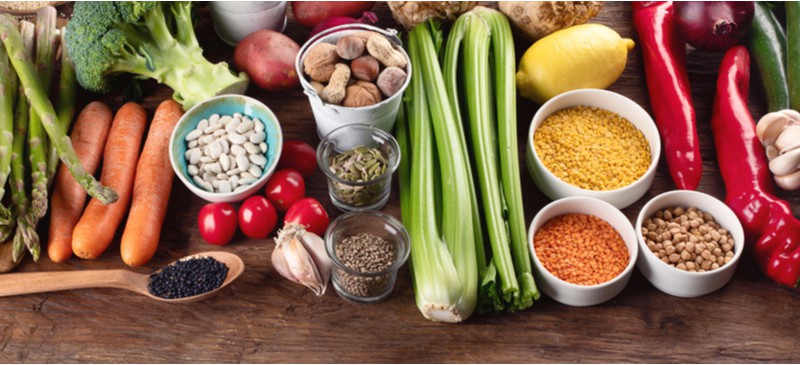
Evidence Based
This Dr. Axe content is medically reviewed or fact checked to ensure factually accurate information.
With strict editorial sourcing guidelines, we only link to academic research institutions, reputable media sites and, when research is available, medically peer-reviewed studies. Note that the numbers in parentheses (1, 2, etc.) are clickable links to these studies.
The information in our articles is NOT intended to replace a one-on-one relationship with a qualified health care professional and is not intended as medical advice.
This article is based on scientific evidence, written by experts and fact checked by our trained editorial staff. Note that the numbers in parentheses (1, 2, etc.) are clickable links to medically peer-reviewed studies.
Our team includes licensed nutritionists and dietitians, certified health education specialists, as well as certified strength and conditioning specialists, personal trainers and corrective exercise specialists. Our team aims to be not only thorough with its research, but also objective and unbiased.
The information in our articles is NOT intended to replace a one-on-one relationship with a qualified health care professional and is not intended as medical advice.
11 Essential Nutrients Your Body Needs NOW
April 22, 2020

With so much information circulating out there about nutrition, it can be challenging to make sure you’re getting the nutrients you need each day. In fact, with some sources listing as many as 90 essential nutrients, following a balanced diet can quickly become overwhelming.
However, getting all the nutrients you need doesn’t have to be complicated. In fact, by just being mindful about a few specific nutrients, eating a healthy diet full of nutrient-dense foods can be pretty simple.
Breaking it down into essential versus nonessential nutrients can help simplify and streamline your diet, making it easier than ever to achieve better health. But what are those nutrients, and what do nutrients do, anyway? Let’s take a look at the 11 essential nutrients your body needs, why and how to obtain them.
What Are Nutrients?
According to the dictionary, the official nutrients definition is “a substance that provides nourishment essential for growth and the maintenance of life.”
This encompasses the broad spectrum of micronutrients, healthy fats, amino acids and other substances that your body needs to function, survive and thrive. Most of these are obtained through the things you eat, drink or supplement in your diet.

However, this nutrients definition doesn’t differentiate between essential and nonessential nutrients.
While there are thousands of specific nutrients, each with its own unique benefits and functions, there are a few specific nutrients that you should be especially mindful about incorporating into your day. And although there are technically six essential nutrients, there are certain healthy fats, vitamins and minerals that you should be sure to include in your diet as well.
Essential Nutrients vs. Nonessential Nutrients
So what exactly distinguishes an essential nutrient from a nonessential nutrient?
There are six essential nutrients found in the body, including carbohydrates, fats, proteins, water, vitamins and minerals — with proteins, carbs and fats classified as macronutrients. These are the main classes of nutrients, which can further be broken down into specific micronutrients that are especially important for health.
Essential nutrients cannot be produced by the body and must be obtained through other means while many nonessential nutrients can be both synthesized and absorbed from food.
Cholesterol, for example, is needed to produce hormones and maintain the cell membrane, but it can be either obtained from food or produced in the body.
Benefits
Meeting your essential nutrient needs can come with major benefits in terms of your health.
In fact, these nutrients are called “essential” for a reason. Without these crucial nutrients, vitamins and minerals, your body would not be able to function properly.
Meeting your potassium needs, for example, helps your heart pump blood throughout your body, while calcium and vitamin D keep your skeletal framework strong and sturdy.
Other important benefits that come with getting enough nutrients include improving your immune system, building muscle, keeping your heart healthy and staying hydrated — as well as sustaining life and keeping your body working efficiently.
11 Essential Nutrients
1. Carbohydrates
Despite being demonized as “unhealthy” or “fattening,” carbohydrates are critical to the function of your body. Carbohydrates are broken down into glucose, which is the primary source of fuel for your body and brain.
Not only do they provide energy for the body, but they also help stabilize blood sugar levels and preserve muscle mass by preventing the breakdown of proteins for energy.
Plus, some of the world’s healthiest foods fall into the category of carbohydrates. Fruits and vegetables, for instance, are incredibly nutrient-dense and loaded with important vitamins, minerals and antioxidants.
Even on a low-carb or ketogenic diet, you’re still taking in a few grams of carbohydrates here and there, making healthy carbs an important part of any diet.
Complex carbohydrates take longer to break down, which can help you feel fuller for longer and keep blood sugar levels regular.

Whole grains, vegetables and fruits are a few examples of healthy complex carbohydrates that can fuel your body and supply you with a megadose of nutrients.
2. Protein
It’s no secret that protein is critical to good health. From forming muscle to creating new enzymes and hormones, getting enough protein in your diet is key.
Proteins are made up of building blocks called amino acids, which are composed of even smaller units called peptides.
There are 20 types of amino acids, all of which are important. However, nine of these are considered essential amino acids because they can’t be produced by your body.
The nine essential amino acids include:
- Histidine
- Isoleucine
- Leucine
- Lysine
- Methionine
- Phenylalanine
- Threonine
- Tryptophan
- Valine
While animal proteins provide adequate amounts of all essential amino acids, plant-based proteins are typically lacking in one or more.
The best way to ensure adequate protein intake is to include a variety of protein foods in your diet, such as meat, eggs, dairy, nuts and beans.
3. Fat
Much like carbohydrates, dietary fat has earned an undeservedly bad reputation because of its association with body fat.
Fat is an essential nutrient that provides energy, boosts the absorption of certain vitamins and helps protect your organs from damage.
Some types of fat are better than others, however. Trans fats, for example, are a type of fat found in processed foods, baked goods and shortening. This type of fat has been shown to significantly increase the risk of heart disease and should be avoided at all costs.
Unsaturated fats, on the other hand, can actually help protect the heart and aid in the prevention of heart disease.
Healthy sources of fat include nuts, avocados, salmon, olive oil, flaxseed and nut butters.
Including a few servings of these foods per day can help provide the fats your body needs and protect against disease.
4. Water
The human body can survive for long periods of time without food. In fact, there have been case studies reporting on some extreme cases of people who have successfully gone without eating for 382 days under medical supervision with no negative side effects. Of course, I’d never recommend such extreme fasting — I simply point this out to highlight the importance of water.
While you may be able to go without food for quite a while, even just a few days without water can be detrimental.
Water accounts for a pretty big portion of the body, making up somewhere between 55 percent to 75 percent of your body mass.
It plays an essential role in waste removal, digestion and temperature regulation and makes up a core component of every cell in your body.
Dehydration can lead to symptoms like dry skin, dizziness, fatigue, a rapid heartbeat and even death if left untreated.
In addition to the things that you drink, you also take in water through the foods that you eat as well. Fruits and vegetables, in particular, tend to have a higher water content and can help keep you hydrated.
5. Vitamins
You’ve likely heard all about the importance of vitamins like folate, vitamin C and vitamin A, among others, so it should come as no surprise that vitamins make the list of essential nutrients.
There are many different types of vitamins, each with its own specific function and role in the body, but all equally vital for maintaining optimal health.
Vitamin A, for instance, is critical for the health of your eyes and skin, while vitamin K builds strong bones and is involved in blood clotting.
There may be minute differences in the amounts of specific vitamins for men versus women, but in general, the essential vitamins that your body needs are:
- Vitamin A
- Vitamin C
- Vitamin D
- Vitamin E
- Vitamin K
- B vitamins, including thiamine, riboflavin, folic acid and vitamin B12
The best way to get in all of these vitamins is to eat a healthy and balanced diet with plenty of vegetables and fruits. A multivitamin may also be useful to help fill in the gaps if you have a restrictive diet.

6. Minerals
Much like vitamins, minerals are also important for helping your body function properly and stay healthy, and each comes with its own specific role.
Iron, for example, is key to the production of red blood cells, phosphorus strengthens the bones and teeth, and magnesium is a crucial component of more than 300 reactions in the body.
The minerals that your body needs include:
- Sodium
- Iron
- Potassium
- Calcium
- Chloride
- Magnesium
- Phosphorus
- Trace minerals
These can all be obtained through food, so eating a nutritious diet can prevent deficiencies and make sure you’re getting the minerals that you need.
7. Calcium
You probably know calcium as the most important nutrient for bone health, and that’s true. Although there are several nutrients that are key to building strong bones, over 99 percent of the body’s calcium is found in the bones and teeth.
However, that’s not all calcium is good for. Calcium is also involved in muscle contractions, nerve function and the movement of blood throughout the body.
Calcium is found naturally in dairy products, leafy greens, white beans, and certain types of fish like sardines and salmon. Including these foods in your diet is the easiest way to ensure you’re meeting your daily calcium requirements.
8. Sodium
Although sodium receives a lot of negative attention for its association with high blood pressure, it’s actually incredibly important to health.
Sodium regulates fluid balance and blood volume while also keeping your nerves and muscles working correctly.
Of course, sodium should be included in moderation as excessive amounts can lead to high blood pressure in some people.
The most recent Dietary Guidelines for Americans recommend limiting sodium intake to less than 2,300 milligrams per day, which equates to about one teaspoon of salt.
Sodium is found naturally in many foods, including seeds, nuts, vegetables, meats, grains and legumes. Intake of high-sodium foods like frozen and ultra-processed foods, salty snacks, and canned meats with added salt should be minimized.
9. Potassium
Potassium is an essential electrolyte that helps maintain fluid balance and blood pressure. It also is necessary for muscle contractions, heart health and regulating the pH level of your blood to prevent it from becoming too acidic.
While most people instantly associate potassium with bananas, potassium is actually found in a wide variety of other vegetables and fruits as well.
Spinach, tomatoes, potatoes, avocados, salmon and sweet potatoes are all other excellent sources of potassium.
10. Omega-3 Fatty Acids
From optimizing brain health to preventing heart disease, omega-3 fatty acids are a vital component of many aspects of health.
Omega-3 fatty acids are a type of polyunsaturated fat that are considered an essential fatty acid. This means that, unlike other types of fatty acids, your body can’t synthesize omega-3 fats and needs to obtain them from food.
Varieties of fatty fish, such as salmon, mackerel and sardines, are the best source of omega-3 fatty acids. These contain the active forms of omega-3 fats that can be easily used by the body.
Some plant foods, such as chia seeds, flax and walnuts, also contain omega-3s. However, they contain a form of omega-3 fatty acid that is converted only in small amounts to the more active forms.
You should include one to two servings of fish in your diet each week to help meet your omega-3 fatty acid needs. Otherwise, consider taking a fish oil or algae supplement to get some omega-3s into your day.
11. Vitamin D
Also known as the “sunshine vitamin,” getting enough vitamin D is incredibly important.
Vitamin D is a fat-soluble vitamin necessary for the absorption of calcium and can promote good bone health, making it an especially important vitamin for women to help prevent osteoporosis.
Additionally, some research shows that vitamin D could strengthen the immune system and influence muscle function.
This fat-soluble vitamin is produced in the skin as a result of sun exposure and can be obtained in small quantities through foods like mushrooms, eggs and fish.
Those who have dark skin, are obese or get limited exposure to sunlight are at a greater risk for vitamin D deficiency. For these individuals, supplementation can be beneficial to prevent deficiency.
Related: Volumetrics Diet Plan Review for Weight Loss: Pros, Cons and Steps
Top Sources
It may seem like cramming all of these essential nutrients into your diet would take a great deal of time, effort and energy. Luckily, it’s actually much simpler than it seems to get what you need each day with minimal effort required.
Although the types and sources of nutrients were listed earlier, there’s no need to meticulously follow any specific list or guide to have a healthy diet. In fact, by simply following a diet rich in whole foods with plenty of fruits, vegetables, whole grains, lean proteins and a few servings of fish each week, you’ll be getting a hearty dose of the daily essential nutrients you need with every meal.
These foods are the most nutrient-dense and can supply a concentrated amount of micronutrients with each serving.
Although most people can get all the nutrients they need from food, if you have a restrictive diet or need an extra boost, you can also consider a multivitamin or supplementation to help meet your needs.
Interesting Facts
Deficiencies of essential nutrients have been documented for centuries, although we are just recently beginning to gain a deeper understanding of the complexities of these nutrients.
In ancient Greece, philosophers developed a concept called humoralism in which it was believed that a deficiency in one of four essential “humors,” or bodily fluids, could lead to negative effects on health.
Later on, the link between food and health began to be established. In the 18th century, scurvy was a major cause of death among British sailors. Scurvy can lead to bleeding gums, fatigue and bruising, and is caused by vitamin C deficiency.
Sailors began routinely chugging lime juice as a method to get in a concentrated dose of vitamin C and ward off scurvy.
In recent years, more and more research trials have been conducted to illustrate just how important essential nutrients are to health.
Today, as the powerful effects of nutrition come to light, the emphasis continues to switch from treatment to prevention through nutrient-rich foods and a healthy lifestyle.
Risks and Precautions
Getting your essential nutrients through whole food sources is always preferable, but there may be some cases in which supplementation is needed. However, it’s always best to consult with your doctor before starting any new supplement, especially if you have underlying health conditions.
Additionally, keep in mind that moderation is key and just because a nutrient is considered essential doesn’t necessarily mean that more is always better.
Too many carbohydrates, for example, can lead to spikes and crashes in blood sugar, while too much water can lead to a condition called water intoxication, which can be dangerous. Other vitamins and minerals like iron, potassium and vitamin A can also be dangerous as well.
Enjoy moderate amounts of all of the essential nutrients you need to achieve better health and well-being.
Final Thoughts
- Essential nutrients are essential to health. They may come with plenty of health benefits, but most importantly, they help sustain your body and allow it to grow, develop and thrive.
- While it may seem daunting to comb through a long list of food nutrients and their sources and functions, eating healthy and squeezing in all the essential nutrients you need doesn’t have to be challenging.
- Eating a well-balanced, healthy diet rich in fruits, vegetables, whole grains and lean proteins is enough for most people to get all of the nutrients, vitamins and minerals that they need.










